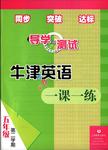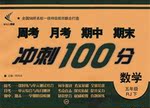题目内容
The key is made ________ metal.
- A.in
- B.from
- C.of
- D.for

 导学与测试系列答案
导学与测试系列答案 新非凡教辅冲刺100分系列答案
新非凡教辅冲刺100分系列答案What do you think of stress? Is it a good thing or a bad thing?
Most of the students think stress can do harm (伤害) 46 them in some ways. There’s a story about a teenager in a middle school. He even 47 his study because of the stress from school and family. We also usually 48 that someone turns to psychological doctors because of heavy working stress. There is no doubt (疑问) that some people think stress is a dangerous wolf.
On the other hand, other people argue that stress is not a bad thing. They 49 stress can produce momentum (动力)in the end. For them, right attitude and action can reduce (减少) stress and make it 50 . When I was a child, my mom always pushed me to study hard. She wished I could go to an ideal 51 for further education. I experienced stress for the first time. To a poor family, I deeply knew 52 was not easy for us, and everything my mom did to me was just to hope I could live a better life in the future. 53 the saying goes, “No pains, no gains.” So I did what my mom expected because I didn’t want to let her down. At last, I did measure up (达到标准)to my mom’s expectation and go to college 54 . Thanks to my mom’s push! Thanks to the stress! In this way, I don’t think stress is a bad thing.
Overall, stress is not a bad thing in 55 . The key is how we deal with it.
| 【小题1】 |
|
| 【小题2】 |
|
| 【小题3】 |
|
| 【小题4】 |
|
| 【小题5】 |
|
| 【小题6】 |
|
| 【小题7】 |
|
| 【小题8】 |
|
| 【小题9】 |
|
| 【小题10】 |
|
You have probably heard it before, most likely from your English teacher. If you want to become a good writer, read good writing. Unluckily, you may not have understood what did good to you and even what you were supposed to get from that experience.
As you start reading a book, poem, or story, do so with no thought at all and the experience will improve your writing. you may not have understood what did good to you and even what you were supposed to get from that experience.
or to learn. As you progress through the work, think about whether it is “easy” reading or not. Do you become so interested in the subject and flow of the writing that you completely forget the person who wrote it, or does the composition sometimes call too much attention to itself through words and phrases that seem out of place or unexpected? The second situation is a chance to learn from the writer’s mistakes. In fact, the reader should not have to worry about how a writer does “his thing” ... he should be able to just enjoy and learn. Every time a word strikes you as poorly chosen, stop to consider why it has this effect. Also, do not spend a lot of time analyzing (分析) the passage but put more efforts in enjoying it from the whole.
Another thing I do, particularly with nonfiction (非小说) books, is to select a part to read as if it is a completely separate work. Once again, read as a common reader rather than a critic (批评家). For learning how words and phrases work together on the most basic level, however, nothing is more suitable than devoting yourself to reading poems. A poet is often trying to put a book’s worth of meaning and feelings into lines, and every side of the work shows a very close attention to craft (工艺).
As you can see, there is no simple way of reading to improve your writing. The key is not to make it boring. Select writers you admire or like most, and enjoy their works as anyone else would. As long as you are reading, you are improving yourself as a writer.
| Improving Your Writing by Reading | |
| Facts | Reading good writing 【小题1】 you become a good writer. You don’t understand the 【小题2】 of reading and what to get from reading. |
| Ways | Read not to learn but for 【小题3】 . 1) Develop a great 【小题4】 in the subject and flow of the writing. 2) Learn from the writer’s 【小题5】 if possible. 3) 【小题6】 shouldn’t be spent in analyzing the passage but in enjoying the passage from the whole. |
| Read as a common consumer rather than a critic. 【小题7】 yourself to reading poems and enjoy the lines. | |
| Conclusions | Don’t make yourself 【小题8】 with reading. Select your 【小题9】 writers and enjoy their works. You are sure to make 【小题10】 during reading. |
You have probably heard it before, most likely from your English teacher. If you want to become a good writer, read good writing. Unluckily, you may not have understood what did good to you and even what you were supposed to get from that experience.
As you start reading a book, poem, or story, do so with no thought at all and the experience will improve your writing. Just read for pleasure to begin with, or to learn. As you progress through the work, think about whether it is “easy” reading or not. Do you become so interested in the subject and flow of the writing that you completely forget the person who wrote it, or does the composition sometimes call too much attention to itself through words and phrases that seem out of place or unexpected? The second situation is a chance to learn from the writer’s mistakes. In fact, the reader should not have to worry about how a writer does “his thing” ... he should be able to just enjoy and learn. Every time a word strikes you as poorly chosen, stop to consider why it has this effect. Also, do not spend a lot of time analyzing (分析) the passage but put more efforts in enjoying it from the whole.
Another thing I do, particularly with nonfiction (非小说) books, is to select a part to read as if it is a completely separate work. Once again, read as a common reader rather than a critic (批评家). For learning how words and phrases work together on the most basic level, however, nothing is more suitable than devoting yourself to reading poems. A poet is often trying to put a book’s worth of meaning and feelings into lines, and every side of the work shows a very close attention to craft (工艺).
As you can see, there is no simple way of reading to improve your writing. The key is not to make it boring. Select writers you admire or like most, and enjoy their works as anyone else would. As long as you are reading, you are improving yourself as a writer.
|
Improving Your Writing by Reading |
|
|
Facts |
Ø Reading good writing 1. you become a good writer. Ø You don’t understand the 2. of reading and what to get from reading. |
|
Ways |
Ø Read not to learn but for 3. . 1) Develop a great 4. in the subject and flow of the writing. 2) Learn from the writer’s 5. if possible. 3) 6. shouldn’t be spent in analyzing the passage but in enjoying the passage from the whole. |
|
Ø Read as a common consumer rather than a critic. Ø 7. yourself to reading poems and enjoy the lines. |
|
|
Conclusions |
Ø Don’t make yourself 8. with reading. Ø Select your 9. writers and enjoy their works. Ø You are sure to make 10. during reading. |
 r them, right
attitude and action can reduce stress and make it .
When I was a child, my mom always pushed me to study hard. She wished I could
go to an ideal for further
education. I experienced stress for the first time. Born to a poor family, I
deeply knew was not easy for
us, and everything my mom did to me was just to hope I could live a better life
in the future. the saying
goes, “no pains, no gains.” So I did what my mom expected because I didn’t want
to let her down. At last, I did measure up(达到标准) to my
mom’s expectation and go to college .
Thanks to my mom’s push! Thanks to the stress! In this way, I don’t think
stress is a bad thing.
r them, right
attitude and action can reduce stress and make it .
When I was a child, my mom always pushed me to study hard. She wished I could
go to an ideal for further
education. I experienced stress for the first time. Born to a poor family, I
deeply knew was not easy for
us, and everything my mom did to me was just to hope I could live a better life
in the future. the saying
goes, “no pains, no gains.” So I did what my mom expected because I didn’t want
to let her down. At last, I did measure up(达到标准) to my
mom’s expectation and go to college .
Thanks to my mom’s push! Thanks to the stress! In this way, I don’t think
stress is a bad thing.